Daily Vocabulary Words: List of Daily Used Words in Leading Indian Newspapers
Hi there. Welcome to this special section @ Wordpandit. Our endeavour here is straightforward: highlighting daily vocabulary words that you would come across in leading newspapers in the country. We have included the following newspapers in our selection:
• The Times of India
• The Economic Times
• Hindustan Times
• Mint
• Indian Express
We are putting in extensive work to develop your vocabulary. All you have to do is be regular with this section and check out this post daily. This is your repository of commonly used words; essentially, we are posting a list of daily used words. Hence, this has significant practical application as it teaches you words that are commonly used in leading publications mentioned above.
Visit the website daily to learn words from leading Indian newspapers.
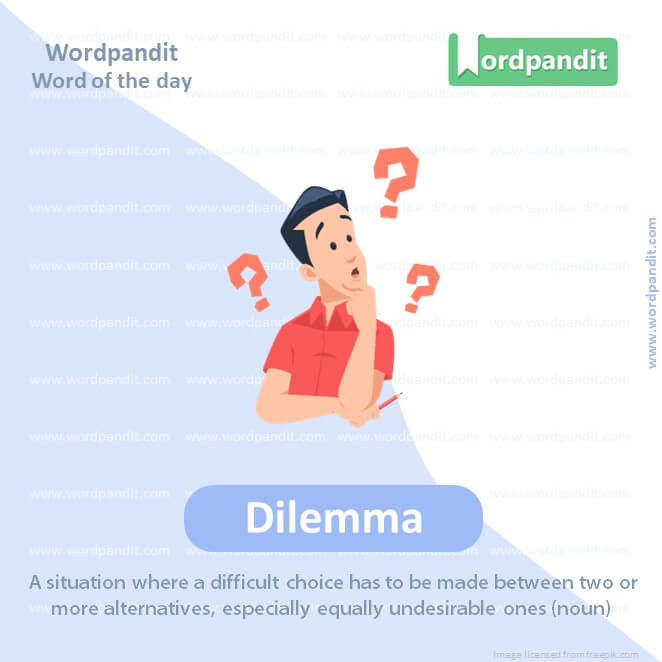
WORD-1: Dilemma
CONTEXT: In the absence of any specific restriction against legislators and politicians practising before courts of law, legislator-lawyers often perform the dual role of law-making and representing their clients. This leads to a curious dilemma, at least in theory, of mixing politics with the law. While the two are not inseparable and eminent political persons have historically risen from the bar, the continuation of political activity while actively practising is a relatively recent trend.
SOURCE: The Indian Express
EXPLANATORY PARAGRAPH: Imagine you have to choose between ice cream and cake, but you can’t have both. This is a dilemma, where you have to make a hard choice between two things.
MEANING: A situation where a difficult choice has to be made between two or more alternatives, especially equally undesirable ones (noun).
PRONUNCIATION: dih-LEM-uh
SYNONYMS: Quandary, Predicament, Pickle, Bind, Conundrum
USAGE EXAMPLES:
1. She faced a dilemma when deciding between going to college or starting a job.
2. The moral dilemma was whether to tell the truth or protect a friend.
3. Every game show contestant faces the dilemma of risking their current winnings for a bigger prize.
4. Choosing between career and family is a common dilemma for many.
WORD-2: Eminent
CONTEXT: In the absence of any specific restriction against legislators and politicians practising before courts of law, legislator-lawyers often perform the dual role of law-making and representing their clients. This leads to a curious dilemma, at least in theory, of mixing politics with the law. While the two are not inseparable and eminent political persons have historically risen from the bar, the continuation of political activity while actively practising is a relatively recent trend.
SOURCE: The Indian Express
EXPLANATORY PARAGRAPH: Eminent is like being very important or famous in what you do, like a superhero who is really good at saving people.
MEANING: Standing out, respected, or prominent in a certain field or area (adjective).
PRONUNCIATION: EM-uh-nent
SYNONYMS: Distinguished, Renowned, Prestigious, Illustrious, Notable
USAGE EXAMPLES:
1. The conference was attended by many eminent scientists.
2. She is an eminent author known for her children’s books.
3. The eminent professor received another award for his research.
4. His eminent achievements in sports earned him a place in the Hall of Fame.
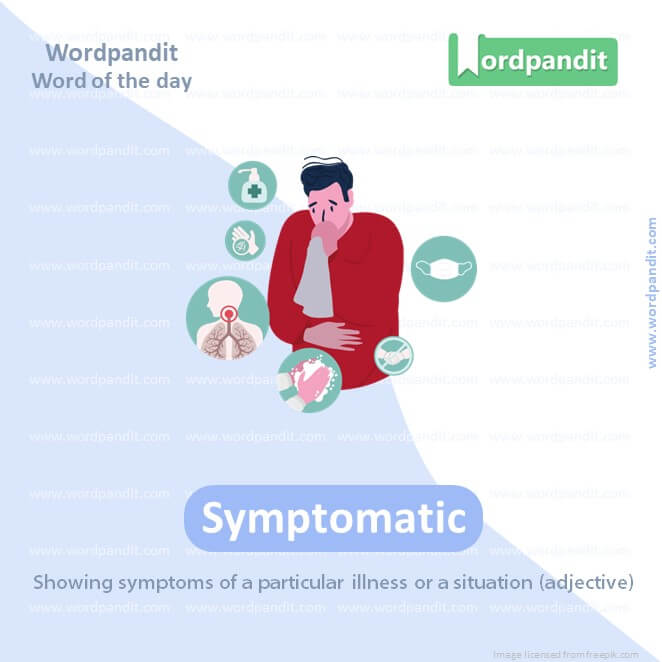
WORD-3: Symptomatic
CONTEXT: The allegations against the judiciary by senior advocate, former Union Law Minister and member of Rajya Sabha Kapil Sibal in a recent article (‘We Are Witnessing Undeclared Emergency & Courts Are Silent’, LiveLaw, November 27) are symptomatic of this problematic trend — one where political intervention in the judiciary is being normalised. The claim of the “courts being on trial” is a rather sophisticated blackmailing tool that ensures that any unfavourable decision can be easily derided. It cunningly questions the independence of the judiciary, inaccurately describes the core values that the judicial system upholds and seeks orders in particular judicial proceedings.
SOURCE: The Indian Express
EXPLANATORY PARAGRAPH: Symptomatic means showing signs of something, like when you have a cold and your runny nose is a symptom.
MEANING: Showing symptoms of a particular illness or a situation (adjective).
PRONUNCIATION: simp-tuh-MAT-ik
SYNONYMS: Indicative, Suggestive, Revealing, Reflective, Representational
USAGE EXAMPLES:
1. His coughing was symptomatic of a severe cold.
2. The economic problems are symptomatic of the government’s failure.
3. Her forgetfulness was symptomatic of her busy lifestyle.
4. The issues in the company were symptomatic of poor management.
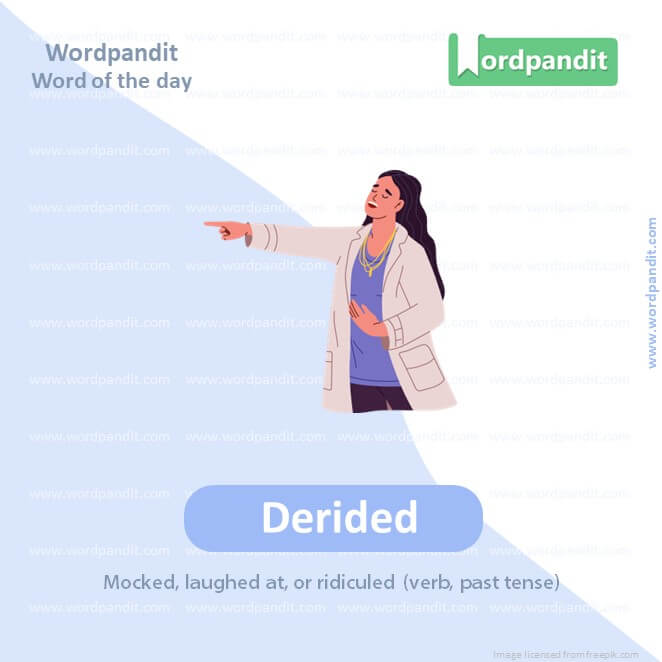
WORD-4: Derided
CONTEXT: The allegations against the judiciary by senior advocate, former Union Law Minister and member of Rajya Sabha Kapil Sibal in a recent article (‘We Are Witnessing Undeclared Emergency & Courts Are Silent’, LiveLaw, November 27) are symptomatic of this problematic trend — one where political intervention in the judiciary is being normalised. The claim of the “courts being on trial” is a rather sophisticated blackmailing tool that ensures that any unfavourable decision can be easily derided. It cunningly questions the independence of the judiciary, inaccurately describes the core values that the judicial system upholds and seeks orders in particular judicial proceedings.
SOURCE: The Indian Express
EXPLANATORY PARAGRAPH: Derided is like when someone makes fun of your favorite toy, saying it’s silly or stupid.
MEANING: Mocked, laughed at, or ridiculed (verb, past tense).
PRONUNCIATION: duh-RY-ded
SYNONYMS: Mocked, Ridiculed, Scoffed, Taunted, Jeered
USAGE EXAMPLES:
1. The new policy was derided by the employees as impractical.
2. He derided his opponent’s proposal during the debate.
3. Her novel, once derided by critics, eventually became a bestseller.
4. The old technology was derided as outdated.
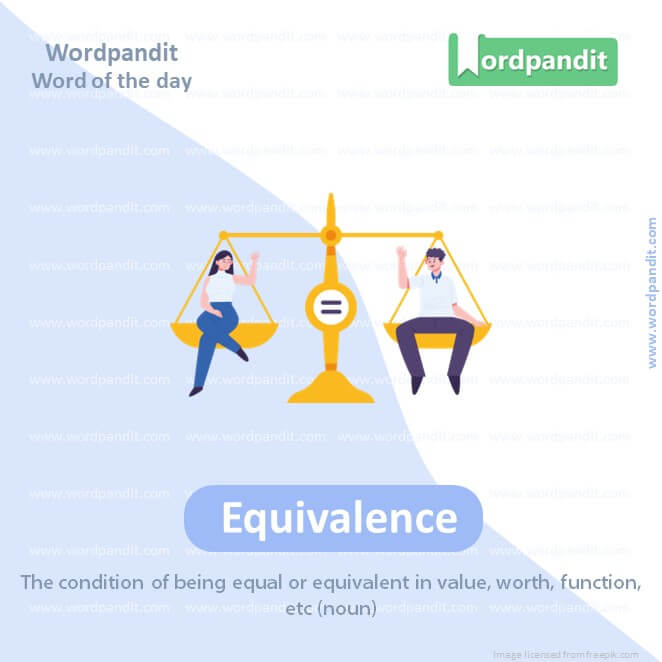
WORD-5: Equivalence
CONTEXT: This critique of the court is based on a false equivalence between the 1975 Emergency and the present times. The Emergency era is unique in Indian constitutional history, wherein constitutional amendments were a dime a dozen, and attempts were made to literally rewrite the Constitution (the 42nd amendment).
SOURCE: The Indian Express
EXPLANATORY PARAGRAPH: Equivalence is when two things are equal or the same in value, like sharing cookies equally with a friend.
MEANING: The condition of being equal or equivalent in value, worth, function, etc. (noun).
PRONUNCIATION: ih-KWIV-uh-lents
SYNONYMS: Equality, Parity, Sameness, Correspondence, Equalness
USAGE EXAMPLES:
1. The equivalence of the two currencies made trade easier.
2. In math, we learned about the equivalence of two fractions.
3. He argued for the moral equivalence of the two actions.
4. There is no equivalence between their situations.
WORD-6: Dime a dozen
CONTEXT: This critique of the court is based on a false equivalence between the 1975 Emergency and the present times. The Emergency era is unique in Indian constitutional history, wherein constitutional amendments were a dime a dozen, and attempts were made to literally rewrite the Constitution (the 42nd amendment).
SOURCE: The Indian Express
EXPLANATORY PARAGRAPH: Dime a dozen means something is very common and not special, like finding rocks in your backyard.
MEANING: Very common and of little value or not unique (idiom).
PRONUNCIATION: DYME-uh-DUH-zuhn
SYNONYMS: Commonplace, Ordinary, Ubiquitous, Plentiful, Abundant
USAGE EXAMPLES:
1. These days, coffee shops are a dime a dozen.
2. Good writers are rare, but bloggers are a dime a dozen.
3. Smartphone apps are a dime a dozen nowadays.
4. Ideas are a dime a dozen; it’s the execution that counts.
WORD-7: Subjective
CONTEXT: The judiciary has in no manner been a mute spectator. Rather, it has expanded its scope of jurisdiction and developed newer forms of judicial review of legislation on vague and subjective grounds like constitutional morality, manifest arbitrariness, transformative constitutionalism, proportionality, etc.
SOURCE: The Indian Express
EXPLANATORY PARAGRAPH: Subjective is like when you think chocolate is the best flavor, but your friend might not agree. It’s based on personal feelings.
MEANING: Based on personal feelings, tastes, or opinions (adjective).
PRONUNCIATION: suhb-JEK-tiv
SYNONYMS: Personal, Opinionated, Biased, Individual, Personalized
USAGE EXAMPLES:
1. Movie reviews are often subjective.
2. Her subjective experience influenced her view of the event.
3. Art is largely subjective, as everyone has different tastes.
4. Subjective symptoms are not easily measured by doctors.
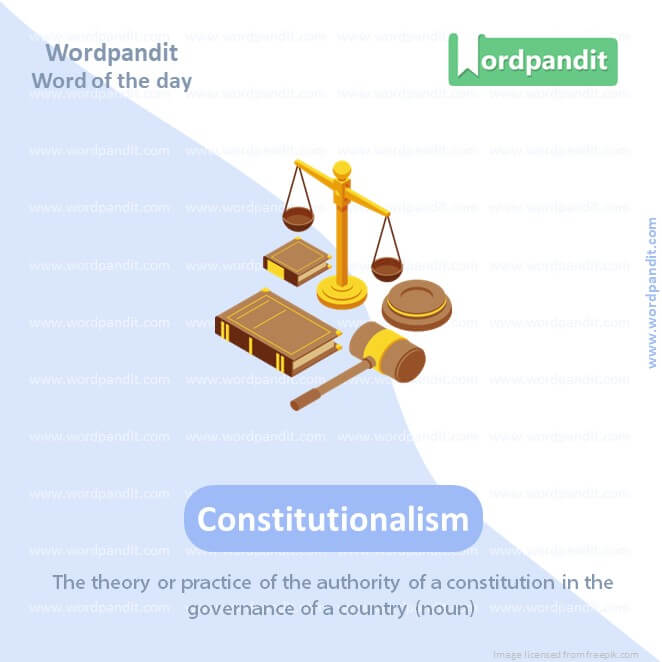
WORD-8: Constitutionalism
CONTEXT: The judiciary has in no manner been a mute spectator. Rather, it has expanded its scope of jurisdiction and developed newer forms of judicial review of legislation on vague and subjective grounds like constitutional morality, manifest arbitrariness, transformative constitutionalism, proportionality, etc.
SOURCE: The Indian Express
EXPLANATORY PARAGRAPH: Constitutionalism is like having rules in a game that everyone must follow, even the person who is in charge.
MEANING: The theory or practice of the authority of a constitution in the governance of a country (noun).
PRONUNCIATION: kon-stuh-TOO-shuh-nuh-liz-um
SYNONYMS: Legalism, Statism, Rule of Law, Institutionalism, Governance
USAGE EXAMPLES:
1. The country’s commitment to constitutionalism ensures that all laws follow the constitution.
2. Constitutionalism is important for maintaining democracy.
3. His book discusses the history of constitutionalism in Europe.
4. The court’s decision upheld the principles of constitutionalism.
WORD-9: Defections
CONTEXT: Any serious constitutional scholar would admit that in the past decade, the Supreme Court has had a far more intrusive role as a constitutional court. The recent decisions of the Court in matters concerning defections, which seek to keep petitions pending while a Speaker is to act, are not only unwarranted but also directly impact the trust that the Indian public holds in one of the mightiest organs under the Constitution.
SOURCE: The Indian Express
EXPLANATORY PARAGRAPH: Defections are like when someone on your team decides to play for the other team instead.
MEANING: The act of abandoning a position or association, often to join an opposing group (noun).
PRONUNCIATION: dih-FEK-shuhns
SYNONYMS: Desertions, Betrayals, Apostasies, Abandonments, Renunciations
USAGE EXAMPLES:
1. The political party was weakened by the defections of several members.
2. The army faced problems due to defections of its soldiers.
3. His defection to the rival company was a shock to everyone.
4. Defections from the ideology signal a change in public opinion.
WORD-10: Rigorous
CONTEXT: In the past decade, the standard of judicial review has become sharper and more rigorous. This restricts the role of the democratically elected legislature. In fact, to the chagrin of Sibal perhaps, regular non-political legal practitioners have often criticised this expansionist nature of judicial review.
SOURCE: The Indian Express
EXPLANATORY PARAGRAPH: Rigorous is like when you have to clean your room really well, not missing any spots.
MEANING: Extremely thorough, exhaustive, or accurate (adjective).
PRONUNCIATION: RIG-uh-rus
SYNONYMS: Strict, Stringent, Thorough, Meticulous, Intense
USAGE EXAMPLES:
1. The research project required rigorous analysis.
2. She followed a rigorous exercise regime.
3. The teacher is known for his rigorous grading standards.
4. Rigorous testing ensured the product’s quality.
Vocabulary Importance
In the realm of language learning, understanding ‘vocabulary importance’ is a fundamental concept. Words are the building blocks of language and a rich vocabulary fuels effective and persuasive communication. However, embracing ‘vocabulary importance’ involves more than just acknowledging its role – it requires you to integrate it into your learning strategy.
To truly grasp ‘vocabulary importance’, expose yourself to a variety of reading and listening activities. Whether it’s reading novels, engaging with podcasts, or watching films in your the profound impact of having a robust vocabulary arsenal and will illuminate the practical ‘vocabulary importance.’
Additionally, recognizing ‘vocabulary importance’ necessitates an active approach to vocabulary acquisition. Regularly dedicate time to learning new words. Use flashcards, word lists, language apps, or even set a ‘word of the day’ to maintain a steady flow of vocabulary learning.
Incorporating the learnt vocabulary into your speech and writing is non-negotiable when understanding ‘vocabulary importance’. Regular usage not only enhances vocabulary retention, but it also uncovers the magic of eloquent expression that a blossoming vocabulary can yield.
It’s also beneficial to lean on memory aids in recognizing ‘vocabulary importance’. Associating words with images, stories or personal anecdotes creates strong memory hooks, enhancing vocabulary recall and solidifying the understanding of ‘vocabulary importance’.
To sum it up, ‘vocabulary importance’ is not just a theory to be noted, but a mantra to be embraced in your language learning journey. Engage with a wide variety of resources, actively learn and use new words, and utilize effective recall techniques. As you uncover the depths of ‘vocabulary importance’, you’ll realize that every new word is a fresh shade on your language palette, painting your communication canvas with hues of eloquence, clarity, and confidence.













